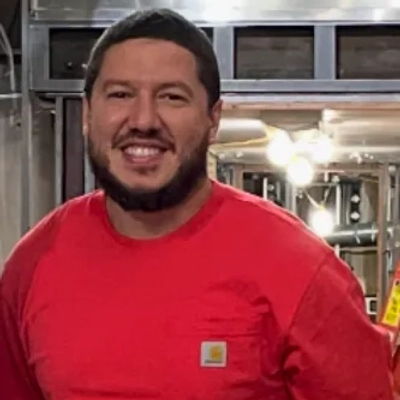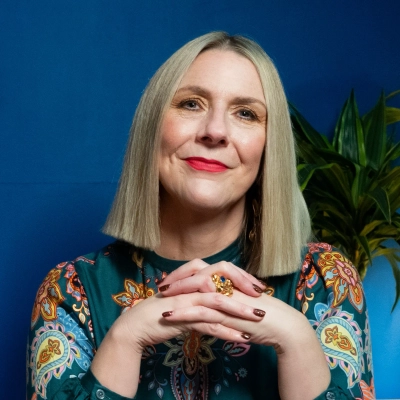Startup Traditions That Spark Team Unity: Founders Share Stories
Startup founders know that building a strong, unified team is crucial for success. This article explores unique traditions that foster team spirit and collaboration, as shared by experienced entrepreneurs. From personal conversations to creative problem-solving methods, these insights offer practical ways to enhance workplace culture and team cohesion.
- Start Meetings with Personal Conversations
- Display Customer Feedback Throughout Office
- Implement Weekly No-Agenda Team Check-Ins
- Host Informal Weekly Story-Sharing Sessions
- Solve Problems on Neighborhood Stoops
- Create Celebration Jar for Team Achievements
- Share Weekly Wins in Digital Workspace
- Present Personal Values Through Culture Capsules
- Walk Property to Visualize Future Plans
- Toast New Hires and Clients Together
- Provide Regular Team Lunches for Bonding
- Establish Fun Rituals and Clear Behaviors
- Play Online Trivia for Remote Team Building
- Hold Monthly Wins and Lessons Meetings
- Dedicate Time for Cross-Departmental Learning
- Rotate Seating to Foster Interdepartmental Connections
Start Meetings with Personal Conversations
One tradition I established early on in my startup was making it a point to start every meeting by having a casual conversation about our personal lives, intentionally avoiding work-related topics. This tradition originated when I was working at a large law firm with a Counsel who always ensured we adhered to our “Casual Fridays” Zoom calls. During these calls, we wouldn’t discuss work for at least 30 minutes to an hour before addressing business matters.
I’ve carried this practice forward to Launch a Biz, and I firmly believe that when you work with someone who genuinely cares about you as a person, you perform better and work harder. Actually getting to know that person makes a huge difference. Too often at my old law firm, I was thrown into deals with teams where I didn’t even know the people I was working with.
Taking time to connect on a personal level before diving into work creates a stronger sense of trust and helps build better team chemistry. This simple gesture goes a long way in forming a positive, collaborative culture, something we instill in ourselves and with every single one of our clients.
Eli Bienstock
CEO, Launch a Biz (LAB)
Display Customer Feedback Throughout Office
I’m Steve Morris, founder and CEO at NEWMEDIA.COM. I want to share a favorite tradition from our early days. It’s a practice that I admittedly copied, or let’s say “modeled” from a client, but it has shaped how our team works together and connects. If you’re a founder who cares about company culture, this is something worth considering.
From the beginning, we made it a point to put real, unedited customer quotes all around the office.
We didn’t just tack up sticky notes on a board. Every week, our marketing manager picked out new feedback, selecting the most meaningful comments and sharing them with the whole team. This applied both online and as physical, printed posters that moved around the office. Over time, these “wall quotes” became a regular, visible reminder of the difference we were making, whether it was a compliment about a product feature that solved someone’s problem, or a thank-you from a client whose nonprofit site relaunch completely changed how they reached people.
Reading someone’s honest reaction just minutes after it arrived had a real effect on how our designers and developers saw their work. Suddenly, the next work ticket wasn’t just another item on a to-do list. It was connected to a real person, with a real need, or a real success. I saw it lead to more small conversations and sometimes even debates about how to genuinely delight our clients, not just in theory but focusing on details that matter to actual people.
It wasn’t just about morale, either. When we made an extra effort to share customer feedback widely, we saw clear results. Teams became more engaged, offered more ideas, worked more closely together, and recognized each other’s efforts more often. That matches what Gallup’s 2024 research found, where companies with the most engaged teams saw customer loyalty scores go up by 10%. That fit our experience. When people could really feel the users’ appreciation, teams broke out of their silos and the creative energy in the office increased.
For founders, this is an easy tradition to start. All it takes is a habit of regularly sharing the true, unedited voice of your customers. When you shorten the distance between your team and the impact of their work, the culture will start to change on its own.
 Steve Morris
Steve Morris
Founder & CEO, NEWMEDIA.COM
Implement Weekly No-Agenda Team Check-Ins
One of the most surprisingly effective things we started at Legacy was what we simply called “Check-In, No Agenda.”
It was born out of chaos, I promise — in the early weeks, we were contending with timezone madness, curriculum development, working with families, all at once. So we carved out 30 minutes every week where the team could just… show up. No slides, no KPIs, no agenda. Just us.
Sometimes it turned into venting, sometimes victories, and sometimes just what coffee we were getting. But it became this anchor.
When you’re scaling up, you can so easily just concentrate on what needs to be done. This left space to remember why we were doing it all together. It made the hustle more human.
And as it turned out, that simple no-agenda check-in accomplished more to establish our culture than anything in any manual ever could.
 Vasilii Kiselev
Vasilii Kiselev
CEO & Co-Founder, Legacy Online School
Host Informal Weekly Story-Sharing Sessions
Back when Magic City Pest Control was just getting off the ground, we started something we called “Bug Fridays.” Every Friday after work, we’d all gather in the shop, order in some BBQ, and swap the craziest customer stories from the week—roaches in cereal boxes, raccoons in attics, you name it. It wasn’t formal or planned, just a way to decompress and laugh a little after a hard week. I started it because I knew pest control can be tough, gritty work, and I didn’t want folks carrying that stress home.
It became the glue for our early team. Even the quietest techs started opening up. We learned about each other’s families, shared tips, and started seeing one another not just as coworkers, but as people. That sense of connection stuck as we grew. Today we’ve got more structure, more employees, but we still do Bug Fridays—because those little moments of camaraderie are what built our culture from the start.
 Samantha Stuart
Samantha Stuart
Co-Founder, Magic City Pest Control
Solve Problems on Neighborhood Stoops
We initiated “Stoop Sessions” during our first year navigating NYC’s cannabis licensing process. Every Tuesday night, our team would gather on actual building stoops around the Flatiron District with takeout food to tackle one major business challenge. We had no phones and no formal agenda, just genuine discussions about what was hindering us that week.
These weren’t typical team meetings because we were literally embodying our brand philosophy while problem-solving. One session on a stoop outside our future Fifth Avenue location led to our “Farm to Stoop” concept when someone joked about connecting local growers directly to neighborhood conversations. Another night, we mapped out our entire community workshop strategy after observing how naturally people gathered around stoops in our area.
The tradition became our hiring filter and cultural foundation. New team members had to participate before receiving full responsibilities, which showed us who could handle authentic community building versus just retail work. When we finally opened, customers immediately noticed our staff’s genuine comfort with informal, educational conversations because we had been practicing it for months.
Our customer retention reached 78% in year one, partly because every employee understood that cannabis retail isn’t just about transactions – it’s about continuing the stoop conversation inside our dispensary. Staff naturally create that welcoming, judgment-free atmosphere because they’ve experienced it weekly.
 Chris Kuilan
Chris Kuilan
Co-Founder, Stoops NYC
Create Celebration Jar for Team Achievements
One unique team tradition I established in the early days of my startup was the “Celebration Jar.” Every time a team member achieved something—big or small—they’d write it down and put it in the jar. We would read the notes aloud during our weekly meetings. It became a way to celebrate wins together, build morale, and remind ourselves of the progress we were making.
This tradition helped create a culture of recognition and gratitude, even when things were tough. It kept the team motivated, reinforced a positive work environment, and strengthened our bond by reminding everyone that each contribution, no matter how small, mattered in driving the company forward.
 Nikita Sherbina
Nikita Sherbina
Co-Founder & CEO, AIScreen
Share Weekly Wins in Digital Workspace
In the early days of building my business, I started a simple but powerful tradition: every Friday, I invited my team of freelancers to share their “wins of the week” in Asana. It could be anything from a breakthrough with a client to a small personal victory, whatever made them feel proud. This practice allowed us to hear each other’s voices in what can otherwise be a silent workflow and celebrate the often-invisible progress happening behind the scenes. Over time, it created a culture of mutual appreciation, momentum, and shared joy. For a dispersed, part-time team, this regular ritual became a vital touchpoint for connection. It reminded us of the impact of our work and the people behind it.
Attribution:
Ceri Hand, Creative Coach and Founder of cerihand.com, helping artists and arts professionals grow their network, income and influence.
 Ceri Hand
Ceri Hand
Founder and CEO, Ceri Hand Ltd.
Present Personal Values Through Culture Capsules
In our startup’s early days, we established a tradition called “Culture Capsules.” Each week, a team member creates a small presentation highlighting personal values, inspirations, or hobbies, followed by a casual Q&A.
This practice helped us go beyond job titles and foster genuine connections. It empowered employees to be culture ambassadors, encouraging transparency and trust. Over time, it deepened our sense of belonging and opened channels for honest communication, boosting collaboration and motivation.
By focusing on personal stories, this tradition laid a foundation for positive onboarding and retention, reinforcing a culture where people felt seen, valued, and invested.
 Nir Appelton
Nir Appelton
CEO, The CEO Creative
Walk Property to Visualize Future Plans
In the early days of building Horseshoe Ridge RV Resort, we started a unique tradition called “Friday Field Walks.” Every Friday, our small founding team would walk the undeveloped property together — sometimes with beers, sometimes with dogs — and talk about what we were building, both literally and culturally.
We’d brainstorm ideas, reflect on challenges, and visualize future amenities. It wasn’t formal, but it created space for creative thinking and deep alignment. This ritual grounded everyone in the mission — not just what we were doing, but why it mattered.
It became a weekly reset that built trust, sparked ideas, and reminded us to celebrate progress, even in the messiest stages of development.
 Billy Rhyne
Billy Rhyne
CEO & Founder | Entrepreneur, Travel Expert | Land Developer and Merchant Builder, Horseshoe Ridge RV Resort
Toast New Hires and Clients Together
At LAXcar, one of our first team rituals was the “First Ride Toast.” Whenever we hired a new chauffeur or landed a big client, we’d gather everyone – dispatchers, coordinators, and drivers – and quickly raise a glass in the office. Coffee, tea, or sparkling water – whatever was available to us. The idea was to stop and celebrate that moment together, no matter how tiring the day might have been.
This tradition helped to cement the idea that no one job was more significant than the rest. By celebrating victories as a team, we fostered a sense of appreciation among everyone, whether they were behind the scenes or at the wheel. Newer members of the team felt like part of a greater whole from the start. It made the company seem less like a job and more like a mission we were all on, building together.
 Arsen Misakyan
Arsen Misakyan
CEO and Founder, LAXcar
Provide Regular Team Lunches for Bonding
One tradition we established early on was group lunches. From time to time, at least once or twice a month, the leadership team and I would buy lunch for everyone and have it delivered to the office. Everyone would then take an extra-long lunch break, and we would all spend time having lunch together, laughing, and having a good time. This was a way for us to show our employees that we wanted to support them, and it was also a way for the whole team to bond.
 Edward Tian
Edward Tian
CEO, GPTZero
Establish Fun Rituals and Clear Behaviors
We’ve found that creating a sense of belonging doesn’t require a big budget, just consistency and intention. At Loanspark, we do weekly riddles with small prizes and hold a monthly all-hands called “All Spark” to keep things fun and connected. Calling ourselves “Loanspartans” started organically but quickly became part of our culture and team identity. We also cover lunch during Strategy Sprints so people can stay focused and collaborative. If I have to call out just one thing that’s really helped, it is having clear, action-oriented behaviors. We display them proudly on our website, and they’re part of every new hire’s onboarding and training. It’s how we expect each of us to show up for the work and for each other every day. Check it out here: https://www.loanspark.com/about-us. Small things like these have made a big impact.
Sasha Yablonovsky
CEO, Loanspark
Play Online Trivia for Remote Team Building
Something we did early on was play online trivia together! When you have a hybrid/remote workplace, team bonding activities can inevitably be much harder to plan. However, someone on my team suggested we play trivia one day for fun, so we did it and had a great time! Now it has become a semi-regular tradition for us all to play trivia from time to time to break up routines and have a fun time together virtually.
 Jeremy Yamaguchi
Jeremy Yamaguchi
CEO, Cabana
Hold Monthly Wins and Lessons Meetings
Early on, we started having a “Wins & Lessons” meeting once a month. It was a simple idea that turned out to be something special. We would require everybody, even the leaders, to talk about something they learned and a win they were proud of. It could be something they learned by failing, having a tough time, or just a new idea. We conducted this on a casual video chat at the end of the week, and everyone on the team looked forward to it.
It was amazing how the mix of humility and celebration made the practice stand out. People were honest about what didn’t work, and other people would be willing to help or make ideas. It became normal to fail and learn from it, and everyone in the team celebrated even the smallest wins.
Being open like that is what made our culture what it is today. People are more willing to trust each other, own up to their mistakes, and realize that improvement happens in phases. Despite our growing numbers, we still encourage each department to make time for these check-ins. It keeps our employees grounded and connected, even when they are far away from each other.
 Gianluca Ferruggia
Gianluca Ferruggia
General Manager, DesignRush
Dedicate Time for Cross-Departmental Learning
One of the most meaningful team traditions I’ve experienced was during my time at a CPA consulting firm. Every Friday, we had a one-hour session called “Friday Learn” – a dedicated time to share knowledge across departments, always paired with great food. Each week, someone from a different team would walk us through their work – from tax reporting to audit to experience working in Big 4. It helped everyone understand how the whole operation worked, not just their piece of it. It created a collaborative, curious, and supportive environment that made people genuinely look forward to Fridays.
At a fintech startup I later joined, we introduced “Business Talks” every two weeks after product releases. These open discussions gave the full team – not just leadership – a chance to reflect on what was shipped, how it positioned us in the market, and how customers might respond. It helped build product intuition and made market awareness a shared mindset across teams.
We also ran a bi-weekly innovation challenge, where anyone could submit an idea, pitch it in 5 minutes, take questions, and get voted on by the team. The winning idea would be added to the backlog, and the winner received a $50 bonus. It was a fun and energizing way to keep creativity flowing, sharpen communication skills, and build ownership in the product across the company.
These simple rituals created lasting impact. They brought people together, sparked better thinking, and turned learning and innovation into habits – not just one-off moments.
 Pavlo Martinovych
Pavlo Martinovych
Senior Product Manager | Fintech, AI, and Workflow Automation Expert, Uptiq.ai
Rotate Seating to Foster Interdepartmental Connections
We used to have a tradition in the early days called “Switch Seats Friday.” Each week, the desks would be rearranged, and people would sit with someone from a different function. Marketing would be next to maintenance, admin would be next to a youth care worker, etc. It began as a way to save a little space but soon became a method for the team to get to know what each other was doing without a formal mechanism.
Questions improved, people started to help without being asked to do so, and they began connecting in ways that were not part of their work. It helped our small team avoid the feeling that we were a departmental team. This interfunctional ease is being repeated a few years later in our immediate expediency in solving problems with one another.
 Belle Florendo
Belle Florendo
Marketing Coordinator, Sunny Glen Children’s Home

